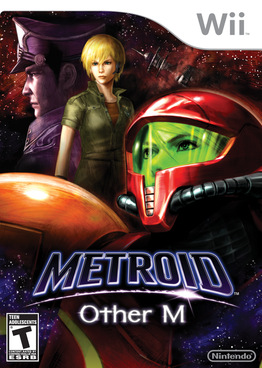 I have been waiting to write this blog literally all year. This has been the culmination of 317 days of waiting for just the right time to finally - FINALLY - write about this game. Going into this year of gaming, there were a few games in my library that I absolutely insisted writing about, for one reason or another. Metroid: Other M was one of those games I had picked out ahead, patiently waiting to speak my mind on something that I have had burning inside of me for over three years now. You see, there used to be this television show called X-Play, that aired on the G4 network. It usually followed the wildly popular Attack of the Show, and was focused entirely on video games and the industry itself. It was a TV show version of like an IGN, or other popular news sites. I watched the show whenever I could, despite them usually being a day or two behind on the news ad reviews. I really liked one of their hosts, Adam Sessler, but unfortunately I couldn't say the same about his co-host, Morgan Webb. From the get-go, there was always something about her that didn't sit right with me. I'm pretty sure a lot had to do with her self-proclaimed disinterest in all things Nintendo, as she more often than not made it point to let everyone know where she stood on that subject, and always talked about their games in almost a demeaning fashion. So when she was pegged to do the review for Metroid: Other M, I was perplexed to say the least. Why would someone who had no interest at all in Nintendo game be reviewing a big game from the Nintendo publishers? I was down-right appalled by her review. She completely assaulted Other M, mocking it for its design choices, game play elements and overall experience of the game. She was cold, ruthless and unrelenting, almost to the point where it felt like she was actually trying to upset Nintendo fans. Of all the things she complained about, I was most taken back by her disgruntlement over the Samus character and how the new developers, Team M, decided to portray her. By not being able to find solid, substantial quotes she actually said about the game, she basically said that the developers made Samus more human and more feminine than past games, mainly pointing out the cut-scenes throughout the game make her more into a woman and strip her of her overall solid and stable frame of mind. By this point, everyone knew Samus to be this strong, independent lead character who is seen as a pioneer for equal rights for female characters in video games. But according to Webb, the development team stripped her of her toughness because they portrayed her to be emotional, loving and a little needy. You know, they basically showed her as being human. *spoiler alert!* I played Other M, and I absolutely loved it, and while I understand that all types of opinions matter and have some merit, I can't say that I take Morgan Webb's opinions too seriously from here on out. Sure, they showed Samus without her gear on, creating a more feminine character than the bounty hunter we all knew and loved, but that's one of the things I liked most about it. Other M didn't make Samus less of an awesome lead character, but instead made her more human, more realistic and easier to attach yourself with. It's important to remember that this game takes place after the events of Super Metroid but before Fusion, so it is totally realistic to think that the entire ordeal messed her up a little, caused some emotional breakdowns and made her more like you and I. Of course once you start playing the game, you are shown a cut-scene of the events at the end of Super Metroid for those unfamiliar with it. Then the game turns her back into the familiar bounty hunter role. So yeah, Samus has some issues and she needs them resolved. The game play switches back and forth between first- and third-person perspective, which adds a certain level of challenge to the game, trying to see the world in a different light than we are used to. The graphics are great, and the controls work well once you get them all figured out. What's funny is that most critics loved the game play and loathed the cut-scenes and dram put into the game. But by today's standards, with storylines being the most important thing in the world, this game may have gotten perfect 10s if it had come out today instead of three years ago. I guess it's just hard for me to let go of a grudge. I mean really, three years later and I am still obsessing over this game with sketchy-at-best attitude when it comes down to the amount of money they have and plan to bring in. I don't hate Morgan Webb as a person, but as a gamer, I feel like she bit off more than she cared to chew with Metroid: Other M, and that's the real shame, because it is an all-time classic in my book. Speaking of which, I did do this blog on the eve of the Playstation 4 release. While that observation has no real baring on what I've typed down on this blog, it's important to say one thing. Greatness Awaits ... me, tomorrow.
0 Comments
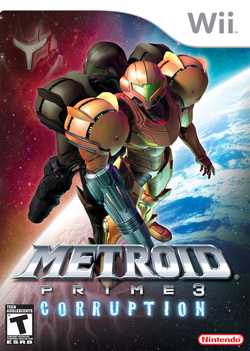 The Nintendo Wii will always be highly regarded for revolutionizing the way we look at gaming controllers. This isn't just my opinion, pretty much the consensus from the industry as a whole. Trust me, I did the legwork, conducted the research and polls, and decided that yes indeed, I am right in my opinion. Sure, the Wii will forever be known and remembered for bringing in the largest casual gaming audience since possibly the original Nintendo, but far more important was the Wiimote and it's motion-sensing control configuration. Up until then, controllers were always just about the buttons, and while the Wiimotes had buttons of course, the ability to just move the controller around in different motions in order to control different functions of the game was mind-blowing to most. At first, people labeled it as just a gimmick, but eventually people came around to the idea of it being a legitimate way to control a game. Many crappy, "shovelware" games that were pushed out for the Wii eventually turned the motion controls of the Wiimote back into gimmicks that worked poorly, thus souring the entire taste of the console for "hardcore" gamers forever. Somewhere in the middle of the roller coaster ride of respect given and taken away from the controls of the Wii, Retro Studios reemerged and brought the Metroid series over to the newest Nintendo console in the form of Metroid Prime 3: Corruption. Using the Wiimote and Nunchuck controller scheme was a match made in heaven for now familiar style of game that Metroid had become. The First-Person Adventure game had been completely figured out by now, with the only missing up until then being great controls. The GameCube controller and control scheme worked well enough for the most part, but it always seemed like the weakest part of the experience for the two Primes. Well, the Wiimote controller with the motion controls was all Metroid Prime 3: Corruption needed to instantly make it one of the finest games to ever grace a Wii console. On top of the amazing controls was possibly the best storytelling from the series since Super Metroid, as Dark Samus returned, and with her, a dark presence that would corrupt the great bounty hunter and push her to unthinkable limits. It was truly captivating, and a remarkable reminded of how far the series had come. Also, for a game on a system that had no sort of trophy or achievement system, it is ridiculous how much time I spent in the game trying to get 100% by scanning every single thing possible in the game. Activate the scan mode and look around, scanning everything from landscape to equipment, organic material, creatures and of course enemies. Scanning stuff would unlock information, which ultimately only appealed to the completionists playing. It got vary tedious after a while, I have to admit, but after spending so much time on just that task alone, I felt like I would be wasting all of it if I just gave up half way through. Overall, Corruption was by fay my favorite Prime game, and an amazing conclusion to a fantastic trilogy from Retro Studios. Nintendo clearly made the right choice in handing over the reigns to them, and it severed everyone well. Samus was here to stay, and the Metroid series had cemented itself as one of the elite. Does Corruption owe the Wiimote a thank you, or does the Wii owe Metroid a thank you? Either way, they were both better because of each other. 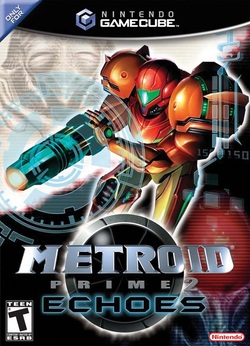 Let me tell you a little story about a boy named Jimmy. For starters, his name was actually James, but everyone called him Jimmy. At the time this story takes place, Jimmy was only a couple of years removed from his high school graduation. He was itching to move out of his parents' house, and had just recently been hired at a local store called Bi-Mart, which only readers from the Oregon/Washington area would understand. It was his first real job as an adult, and with his new-found income, he was looking to transfer that into a place to live other than with his parents. He wanted to grow up and be the man he was trying to portray. He wanted to be an adult, and take care of his adult responsibilities. I admired his gumption, but his job wasn't exactly a high paying one, especially for a young bachelor to move out on his own in the big, scary world. So he came to my two roommates and I, who were renting a very nice house at the time. (Yes, it was the party house, and looking back, man we had some awesome parties there, many of which I wish I could remember better.) Anyway, Jimmy approached us about moving in as a fourth roommate, only for a short while so that he could save up and eventually get his own place with another buddy of his, who was pretty much in the same position he was in. While we didn't have a fourth bedroom for him, he was perfectly fine with crashing out in the living room on the couch, as it was intended to be a short stay. He offered to pay a little bit of cash to us for letting him, so we all agreed no problem. Besides, he worked with my two roommates, so they would be able to keep on eye on him and make sure he traveled on the right path through life. So he crashed with us, and it was good for all. During his time in the house, he had his twentieth birthday. We all chipped in and got him some presents, including the always inspirational and somewhat subliminal Dr. Seuss book, Oh The Places You'll Go. We thought it was kind of funny, and we all got a good laugh out of it. Other than that and a few other smaller things, we also got him the one video game he mentioned really wanting, which had just came out, Metroid Prime 2: Echoes. At the time, I was going through my now infamous gaming hiatus, and wasn't familiar with any new games coming out, as I was pretty much on a full-on blackout of all things gaming related. So while I didn't know anything about this game at the time, I knew of the series because I loved the first Prime game so much, so I was excited to get the game for him. When he opened the present, he literally almost cried, as I'm pretty sure he didn't think we all were that close of friends. But hey, when you live with me in any capacity, you're as good as family in my eyes. I had no interest in playing the game then with him, and we worked opposite of each other most of the time, so I never really had the chance to watch him or even see it in action. Metroid Prime 2: Echoes would remain a mystery to me until years later, when I went back and repurchased a GameCube and started building my collection of games that I loved before and missed during my hiatus. I, of course, was glad I finally got to play it and wished I had been able to play back when I got it for Jimmy when it first came out. I really hadn't thought about Jimmy or this game in a long time, but replaying it brought back all these memories of that weird time in my life. Aside from that, however, the game itself is really good, and was a good send off for the Metroid series in the GameCube generation. Dark Samus was an awesome touch to the storyline, and the difficulty was dialed up to make the game feel like a true challenge. There was also a multiplayer mode added into the game, which clearly was just Retro Studios and Nintendo trying to capture a corner of the multiplayer market that was running wild in the gaming landscape. I'm glad my roommates and I were able to make Jimmy's 20th birthday back in the day awesome with Metroid Prime 2: Echoes as a present. Not sure if it was the game, or our friendship that cemented the awesomeness of that present, but either way, Echoes will always be tied to boy we called Jimmy. 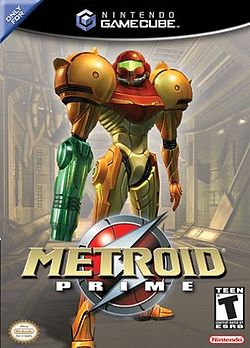 Sometimes, a well-known established franchise has to grow and evolve, despite the commercial and critically acclaimed success of the franchise and games as a whole. Changing the core gameplay mechanics or feeling of a game can be a death sentence for a series, as fans usually have deep-seeded love and admiration for the principle blueprint of what makes the game, and the franchise, so popular in the first place. Even if the change is for the better and meant to take the franchise into the future, fans are fans and don't normally do well with change. They just don't understand change, even if the reasons are fully explained and justified. It's hard for people to accept that something they know and love is now different, and struggle to embrace and cling to the new game as it is, in the new light and vision of the developers. Even worse than just change, when an already established franchise changes hands and is gift-wrapped for a new developer to handle, meltdowns happen all over. Very rarely can a video game series endure a change of the core mechanics of the game and visual styles by a new and different developer as well. Of course, Nintendo has no fear when it comes to going against conventional trends, thinking outside of the box and pretty much marching to the beat of their own drum. They got away with it with the Zelda series, although gamers were pretty used to each game being different anyway. Mario is Mario, and fans just saw each new game as an upgrade to the franchise, not a change. So they looked at Metroid and rolled the dice. And boy did they win big with their gamble. They banked on gamers wanting a change of perspective, from behind the curtain and on screen as well. They handed the Metroid franchise over to Retro Studios, who was an established and highly successful studio that worked closely with Nintendo, but who had never touched the Metroid series. Nintendo had kept this series close to the vest, but finally decided to hand it off to a third-party developer in hopes of hitting a home run. Thankfully, Retro saw the franchise and the story of Samus from a different point of view, and realized that the adventures of this amazing bounty hunter was better told from the first person point of view. They bet on gamers embracing a First Person Shooter style of game, and they were right. Funny thing is, Nintendo didn't see the game as a FPS as everyone knows the genre to be. They wanted to drive home the point of while Samus is a bounty hunter, playing as her isn't as simple as run-and-gun. They made sure that gamers still understood that while you played the game from behind the yellow visor now, you're still responsible for exploration, more so now than ever before. Sure, there is shooting and all that stuff, but getting lost, finding power-ups and retracing your steps throughout an alien landscape is really what the game is all about, and always has been. They called this game a First Person Adventure game. Of course. Sometimes even change can't eliminate the established roots. Retro did a phenomenal job with this game and definitely didn't drop the ball. Playing the game again only cements my long lasting love for this game, and the direction the series went. As far as story goes, Retro placed this Prime trilogy smack-dab in the middle of Metroid and Metroid II, giving them all the wiggle room they needed to pack in as much plot as they needed to fill in the story they were trying to tell. This game came out on the GameCube on the same day as Fusion did for the Game Boy Advance. While both games altered the gameplay in some way, Prime almost felt like an entirely new franchise with the same characters. The old Metroid games were awesome, believe me, but the new perspective of the franchise took Samus to heights she could only dream of before. You know, if Samus could actually dream. I'm sure there's some fan-fiction about that somewhere, right? 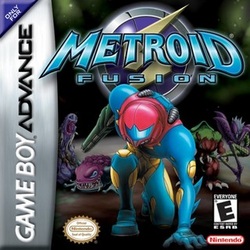 The handheld gaming market has always been a tricky one to figure out. For the most part, developers have always tried to create brand new games that are not only suitable for the handheld consoles they are released for, but perfect for the handheld system. Because of the obvious limitations a handheld, mobile console possess, it's really hard to develop full on gaming experiences that gamers are used to. Gamers want the big, expansive games they are used to on home consoles, not bite-sized, smaller versions of the franchises they are used to. Because of this, developers try to create new IP's, as they don't want to disappoint established fanbases. New franchises are really hard to manufacture, especially ones that will be around longer than one game, and that itself scares publishers away. Usually, this back and forth debate is what forces studios to fall back on established franchises, and they are dealt with the dubious task of not screwing it up. Usually they do, however, and thus creates the vicious cycle of consumers being weary of handheld games and publishers being afraid to push out games for them. Sure, there have been good handheld games before Metroid Fusion, but never on the same par as the already established Metroid franchise. Metroid Fusion was proof to all developers and publishers that a game franchise that already was spanning multiple console generations could produce a really good handheld game. Fusion wasn't exactly the same size as previous Metroid games as far as scope and overall world exploration size, but there will always be limitations when it comes to handheld games. Instead of the large maps to explore and backtrack and forth multiple times throughout the game, Fusion is actually pretty linear for a Metroid game. And honestly, that's OK. The game is pretty much all platforming and puzzle solving, and for me, that's right up my alley. Sadly, I never got to play Fusion when I was younger. Thanks to the awesome Ambassador program that Nintendo rolled out to all the early 3DS adopters, I got this game for free as one of the twenty free games to make me feel better about buying a new console at its release without any games worthy of being played on it. Playing on the big 3DS XL probably doesn't do the game justice as it looked like on the original GameBoy Advance back in the day, but it's suitable for what it is, and it's still a lot of fun. Really glad I got a chance to experience one of the first awesome console-to-handheld franchise games. Now, about that Ambassador Program. Think Nintendo will roll something out for all of us early Wii U adopters? Here's hoping! 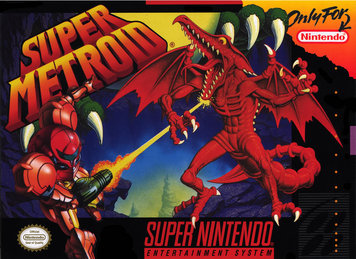 Metroid was an incredibly revolutionary game for it's time. With that being said, Metroid II took the formula already laid out before it, and added to it, with the inclusion of a save system, finally. In the original game, players couldn't save their game, instead using the infamous NES style of save points: passwords. Typing in passwords before you started the game would take you to specific points in the game, allowing you to actually turn off your system every now and then. Looking back on it, it's remarkable so many of the old NES systems still work, and work well, especially considering how long those consoles were usually left on in the middle of game play sessions, you know, when us kids had to go to school and bed and all that not-so-fun stuff. Sure, I guess those machines weren't running anything very heavy duty or heat-producing parts, but still, electronics are pretty sensitive as a whole. Constant power, spit and saliva blown into the machines and the game cartridges and overall misuse and abuse of them should have destroyed way more of them then actually did. Anyway, so the save system of passwords sucked in Metroid, but was refined in Metroid II to a more normal, sufficiently adequate save system. Of course, this eliminated the possibility of the "JUSTIN BAILEY" code, which I honestly knew nothing about until a couple of months ago, thanks to my buddy Tanner, who apparently thought that every human on the planet knew of the JUSTIN BAILEY code. Despite Metroid II being a nice step up in the franchise, however, I decided to skip it in favor of one of the most highly regarded video games of all time, Super Metroid, on the SNES. The game continued the same Metroid-style of gameplay as before, but with the upgraded visual graphics of the new console, the game felt fresher and more awesome than ever before. Sorry for the "awesome" reference, but I just couldn't think of another word to describe the game and experience as I was typing other than "awesome." There's a little fourth wall, behind the curtain writing for you also. Sure, Super Metroid looked great, and Samus was now donning the suit everyone associates with her (which was established in II, but not fully appreciated until this game), but this game was far more important and interesting than just the graphics. They story itself was fascinating, as it captivated the minds and imaginations of gamers of all ages. The previous stories were suitable, and did a decent job establishing a new character and universe, but Super Metroid went above and beyond to ensure that this character and her story would be around for as long as possible. It cemented its place among the Nintendo franchises as one of the best and most memorable, and for everyone who loves the series, it usually always points back to Super Metroid. Being a bounty hunter is cool, and always has been since Boba Fett. Fighting space pirates, especially when the boss of them is a pterodactyl-dragon hybrid creature. Harnessing the power of an alien larva that thinks you are its mom is a little weird, sure. But then you get to the final battle and ending of the game, and suddenly, gaming memories that will last forever happen. You encounter Mother Brain, a biomechanical creature that is, of course, in control of base. It's not called Mother Brain for nothing, you know. Anyway, Mother Brain pushes Samus to the brink of death, only to be attacked by the Metroid you shared a connection with. After destroying almost the entire population of Metroids in the last game, the fact the last of the species that you committed genocide against is helping you was a plot twist like none other. After draining Mother Brain of its energy and transferring it to Samus, Mother Brain recovers just enough to kill the last Metroid. Samus, of course, uses the harnessed energy she was just given to finally destroy Mother Brain, and then narrowly escapes the self destruction of the entire planet. Just sitting there playing and watching this all play out was incredible back then, and even now, is still as powerful as ever. Oh crap, and I forgot to mention something: ******************* SPOILER ALERT!!! ******************* Whoops, sorry about that. But honestly, if you haven't played this game yet and experienced one of the best endings of a video game ever, what is wrong with you? Go find a way to play it now. Even if you already know what happened, it's just one of those gaming moments you will want to keep with you in your memory bank, trust me. 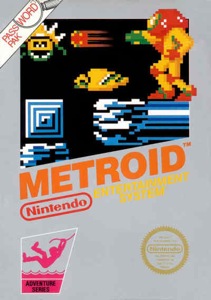 If I can be frank here, it should be obvious to everyone that's ever played games that in the video game universe, females don't get near the respect or fair treatment that they deserve. While this has been a hot button debate recently within the video game media circles, I still feel like this topic is one that shouldn't be just passed over quickly. Sure, the resounding sentiment is that misogyny is overly prevalent in the video game culture, even in today's games, despite the efforts of many publishers and developers to end stereotypes and create a more balanced and respectful gaming culture. But just because everyone is of the same opinion, doesn't mean everything is lollipops and rainbows. The fight for equality in gaming is still ongoing. Just because everyone feels the same way, we're still a long way off from those opinions be translated into actual results and a victory for equality. We've had several leading ladies in video games recently, especially this year, but there is one woman we haven't seen in a while, who pretty much started the movement for strong, lead female protagonists in games. Samus Aran, where are you? It all started back in the NES days, with the release of a space platformer/puzzler/shooter game called Metroid. The thing is, back then, everyone assumed that Samus was a male character. With the suit on and any recognizable features hidden in the sprite character model, determining that Samus was female was impossible. Even in the guide book included with the game, Nintendo referred to Samus as "he," thus possibly being the first ones to troll gamers. It wasn't until gamers figured out to finish the game in under five hours did they discover the ending Nintendo intended the world to experience, where it is revealed for the first time that Samus was, in fact, a woman. I don't remember this as a kid, but I can imagine how shocking it was for people to realize they had been playing a female character the entire time. While it shouldn't make a bit of difference whether you play as a male or female in a game, the unexpected shock of realizing that your preconceived ideas of what's supposed to be, isn't always what they seem. Misogyny doesn't always have to be a conscience, intentional thought or feeling, as society embedded roots of the belief in everyone long before they even realized it. This game, and that ending specifically, broke the notion that every game had to be about being the tough guy trying to save his princess from the clutches of evil. Sometimes that princess can fend for herself just fine. Playing this game again, I unfortunately didn't get to the really cool ending that I'm talking about, but I did have a lot of fun running around, and experiencing the game that sprouted an entirely new genre of games unintentionally. Everyone has heard the term "Metroidvania," I'm sure, referring to the style of Metroid and later Castlevania games, of exploration of the map to find upgrades and new abilities that allow you access to previously unreachable paths in the map in order to advance the overall story and main mission of the game. Instead of taking Path A, you would have to travel to Path C in order to get to Path B, which would allow you to go back and continue on Path A. Confused? Try figuring out while playing the game, when every game before it was pretty much a Point A to Point B, extremely linear type of game progression. In hindsight, it was pretty revolutionary, but back then, it was just something different. Something different in more ways than one, thankfully. |
Details
Gamer Tags
XBLA = The Noyse
PSN = the_noyse NNID = The Noyse 3DS F.C. = 3007-8109-2329 STEAM = TheNoyse FEEL FREE TO FRIEND ME! Stats
Games played for project : 365 Archives
February 2014
Categories
All
|







 RSS Feed
RSS Feed
